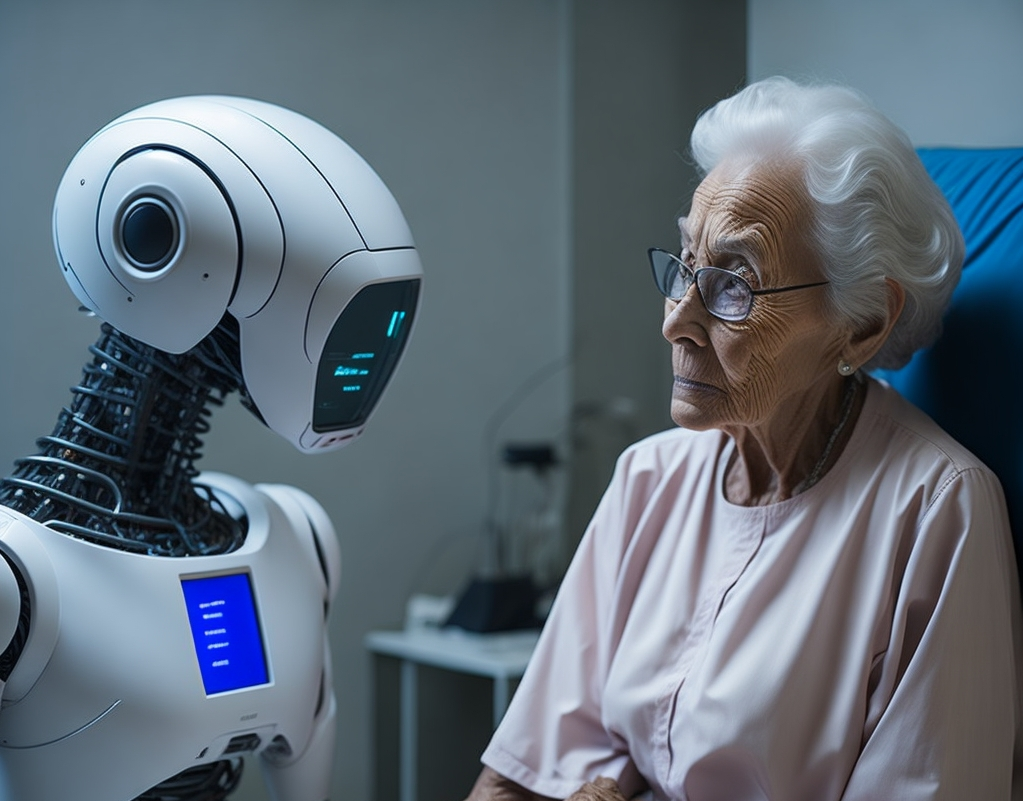Dementia is a debilitating condition that affects millions worldwide and is characterized by a progressive decline in cognitive function. Dementia impacts things like memory, thinking, orientation, comprehension, calculation, learning capacity, language, and judgment. As society continues forward, the prevalence of dementia is expected to rise- making it a pressing public health concern. Amidst this, the role of caregivers, particularly in dementia care, is becoming increasingly crucial. Caregivers not only provide physical assistance to those suffering from dementia, but emotional support as well. Caregivers serve as an integral part of treatment in order to maintain the quality of life for those living with dementia.
Recent advancements in technology have opened new avenues for improving dementia care. An example of these advancements is the application of machine learning, which is a subset of artificial intelligence, in dementia research. Machine learning algorithms are able to analyze large amounts of data in order to identify patterns and make predictions, which provides valuable insights that can enhance our current understanding of dementia, allowing us to then improve upon patient care. A key focus area in dementia research is the connection between dementia and sleep. Sleep disturbances are common in people with dementia and can exacerbate the condition’s symptoms. Recent research has begun to explore this connection more deeply, using machine learning to extract meaningful data from sleep patterns in individuals with dementia.
In the following sections, we delve into this fascinating intersection of machine learning, dementia, and sleep, guided by recent scientific studies. We will explore how these cutting-edge techniques are paving the way for a new era in dementia care, offering hope for patients and invaluable tools for caregivers.
Stay tuned as we navigate this complex landscape, shedding light on the transformative potential of machine learning in dementia care.
The Connection Between Dementia and Sleep
Sleep is an important physiological process that is essential for our overall health and well-being. It plays a significant role in various cognitive functions, including memory consolidation, emotional regulation, and brain health. However, sleep disturbances are very common in people living with dementia and they can often exacerbate both the symptoms and progression of the disease.
A recent scientific paper titled “Using machine learning to extract cognitive status from the sleep EEG in progressing stages of dementia: defining interpretable and age-related features” delves into this intricate relationship between dementia and sleep. The researchers, led by K. Kam and A. Parekh, used machine learning to analyze sleep EEG (electroencephalogram) data from people suffering from different stages of dementia.
The study aimed to identify specific features in the sleep EEG that could indicate a person’s cognitive status. They used machine learning algorithms to go through the EEG data, identifying patterns that could potentially serve as biomarkers for dementia progression.
The findings of this study show the potential of machine learning in enhancing our understanding of dementia. By extracting meaningful information from sleep EEG data, machine learning is able to help us identify early signs of cognitive decline, paving the way for early intervention and improved dementia care.
The research also highlights the importance of sleep-in dementia care. By understanding the connection between sleep and dementia, caregivers can implement new strategies to improve sleep quality, which can in turn potentially slow the progression of the disease and improve the quality of life for patients with dementia.
This study is a testament to the transformative potential of machine learning in dementia research, offering new insights into the complex relationship between dementia and sleep. As we delve deeper into this topic, we will explore more about how machine learning is revolutionizing dementia care.
Machine Learning in Dementia Research
Machine learning, a modality of artificial intelligence, is a powerful tool that’s transforming the fields of medicine and specifically dementia research. By analyzing vast amounts of data and identifying patterns, machine learning algorithms can provide insights that were previously blind to the human eye. This has significant implications for dementia care, offering the potential for early detection, improved diagnosis, personalized treatment plans, and better outcomes for patients.
Two recent studies illustrate the potential of machine learning in dementia research. The first, titled “Dementia risk prediction in individuals with mild cognitive impairment: a comparison of Cox regression and machine learning models,” was conducted by a team of researchers led by Meng Wang. The study compared traditional statistical methods with machine learning models when they were used to predict dementia risk among individuals with mild cognitive impairment. The results highlighted the potential of machine learning in improving the accuracy of dementia risk prediction, which can help with early intervention and treatment planning.
The second study, “Potential Predictors for Cognitive Decline in Vascular Dementia: A Machine Learning Analysis,” used machine learning to identify potential predictors for cognitive decline in vascular dementia. The researchers, led by G. Murdaca and Sara Banchero, found that certain clinical parameters could indeed predict cognitive decline, providing them with valuable insights for early dementia treatment and intervention.
These studies underscore the transformative potential of machine learning when it comes to dementia research and dementia treatment. By allowing us to figure out more accurate predictions and giving us the ability to identify potential predictors for cognitive decline, machine learning can truly enhance dementia care. This will not only benefit patients, but also provide invaluable tools for caregivers so that they can provide more targeted and effective care.
As we continue to explore how machine learning can help us to better understand dementia, it’s clear that we’re entering a new era in dementia care and medical care in general. We are entering an era where technology and human care can not only coexist but collaborate, offering us hope for a future where dementia can be managed more effectively.
The Impact of Machine Learning on Dementia Care
As we’ve seen, machine learning is revolutionizing dementia research and providing us with valuable insights that can improve patient care. You may be wondering, what does this mean for dementia care in practice? How can these technological advancements translate into improved care for individuals currently living with dementia?
One of the key benefits of machine learning is its ability to analyze never-ending amounts of data in order to identify patterns. This can be particularly useful in caring for those with dementia since early detection and intervention can significantly improve patient outcomes. By identifying early signs of cognitive decline, machine learning can help caregivers implement strategies to slow the progression of the disease and improve the quality of life for individuals with dementia.
The Role of Caregivers in the Era of Machine Learning
In the era of machine learning, the role of caregivers in dementia care is dramatically evolving. Caregivers are not just providers of physical and emotional support anymore- they are also becoming facilitators of personalized care plans informed by machine learning insights.
Machine learning can provide valuable information about an individual’s cognitive status and potential risk factors. This information can help caregivers tailor their care strategies to the unique needs of each individual, enhancing the effectiveness of dementia care.
For example, insights from machine learning can help caregivers modify the steps of an activity to promote independence, which can drastically improve the quality of life and mental well-being of those with dementia.
In addition, machine learning can also help caregivers keep their patients engaged in physical activity, which can promote circulation and muscle strength- this is particularly important as physical activity has been shown to have beneficial effects on cognitive function and other symptoms of dementia.
The role of caregivers in the era of machine learning is not just about implementing care strategies; it’s also about understanding the underlying disease and how it progresses. As the Homewatch CareGivers website states, “A trained in-home demenia care professional… understands the underlying disease and its progression.” This understanding is crucial in providing effective dementia care.
In conclusion, the era of machine learning is ushering in a new age of personalized dementia care, where caregivers play a crucial role. By leveraging the insights provided by machine learning, caregivers can provide more targeted and effective care, improving the quality of life for individuals with dementia and providing peace of mind for their loved ones.
Conclusion
As we navigate the complex landscape of dementia care, it’s clear that we’re entering a new era – an era where machine learning and human care converge. The transformative potential of machine learning in dementia research is undeniable. By providing more accurate predictions, identifying potential predictors for cognitive decline, and extracting meaningful information from sleep patterns, machine learning is revolutionizing dementia care.
For caregivers, these advancements offer invaluable tools. Armed with insights from machine learning, caregivers can provide more targeted and effective care, tailoring their strategies to the unique needs of each individual. This not only improves the quality of life for individuals with dementia but also provides peace of mind for their loved ones.
However, it’s important to remember that while machine learning offers promising avenues for dementia care, it’s still a developing field. The models are only as good as the data they’re trained on, and they require validation and testing to ensure their accuracy and reliability.
As we look to the future, one thing is clear: the role of caregivers in dementia care is more important than ever. In the era of machine learning, caregivers are not just providers of physical and emotional support; they are facilitators of personalized care plans informed by machine learning insights. They are at the forefront of implementing the advancements of machine learning in dementia care, playing a crucial role in improving patient outcomes and enhancing the quality of life for individuals with dementia.
In the end, the goal is the same: to provide the best possible care for individuals living with dementia. And with the help of machine learning, we’re one step closer to achieving that goal.
Research Resources
* BMC Medical Research Methodology
* https://www.mdpi.com
* https://academic.oup.com/




